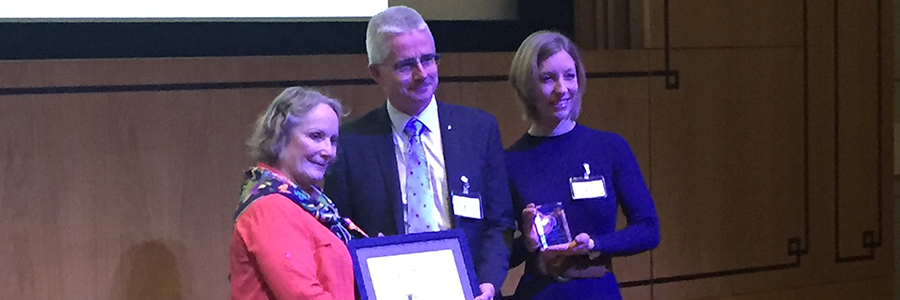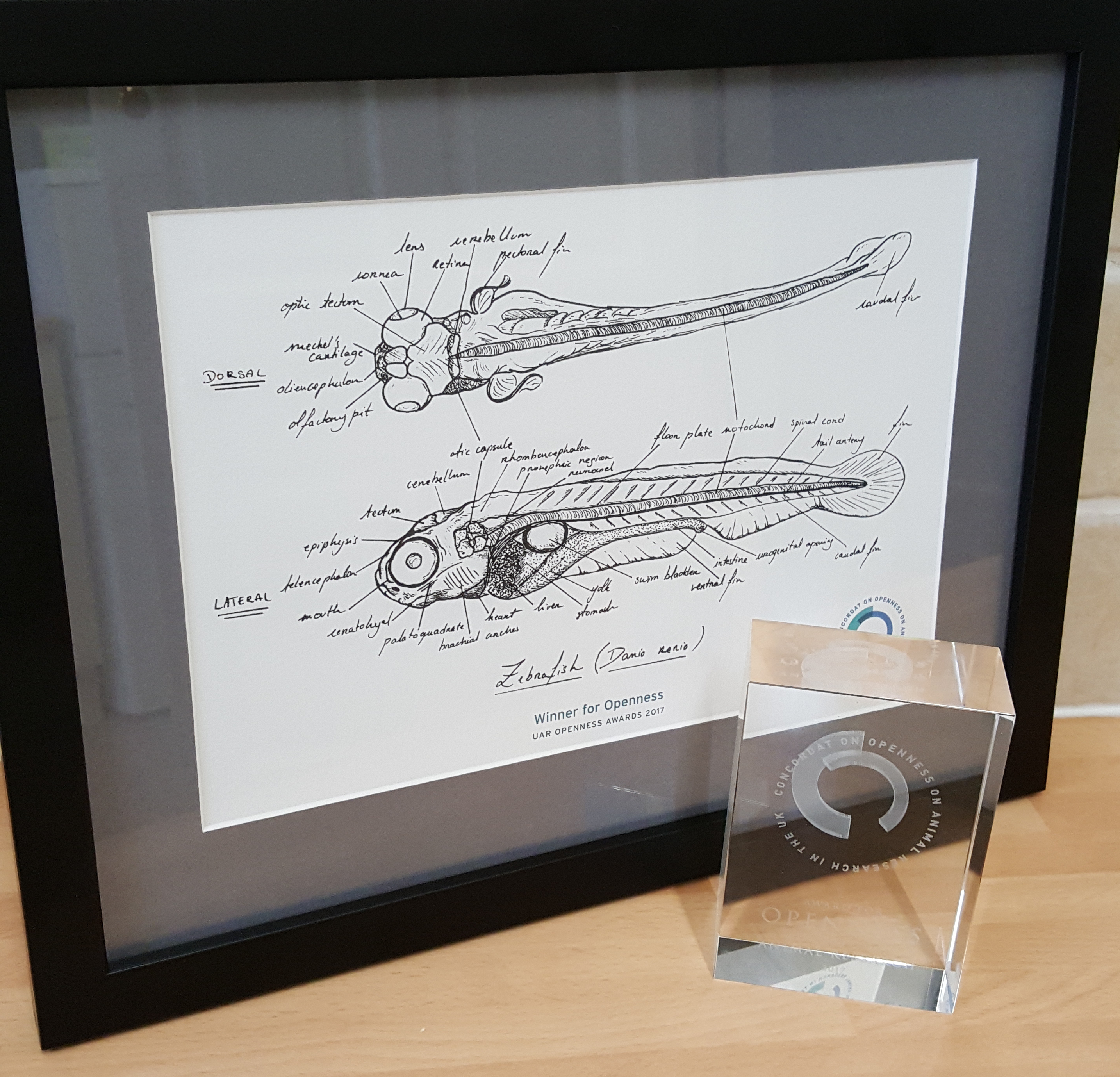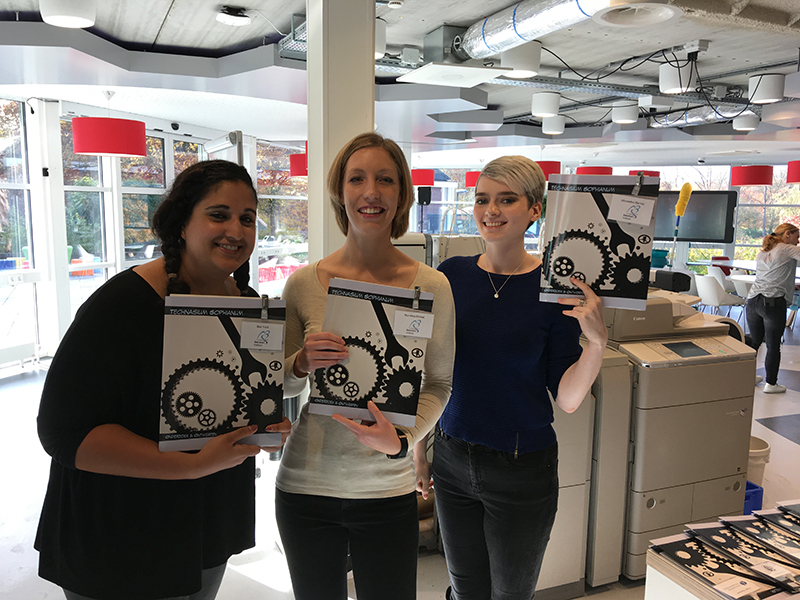Institute wins national Openness Award

 The Babraham Institute is delighted to have won an award recognising our commitment to openness around the use of animals in research. The award recognised the work of volunteers across the Institute and led by the Public Engagement team. It was collected last night (4th December) by Michael Hinton of the Public Engagement team and PhD student Dorottya Horkai at a ceremony held in the Wellcome Collection, London and hosted by Understanding Animal Research.
The Babraham Institute is delighted to have won an award recognising our commitment to openness around the use of animals in research. The award recognised the work of volunteers across the Institute and led by the Public Engagement team. It was collected last night (4th December) by Michael Hinton of the Public Engagement team and PhD student Dorottya Horkai at a ceremony held in the Wellcome Collection, London and hosted by Understanding Animal Research.
The Institute was nominated in the category Internal & Sector Engagement for our work in partnership with Sophianum school in Gulpen, The Netherlands. The partnership forms part of the school’s technical teaching within the Dutch national Technasium initiative. Technasium supports children between the ages of 12 and 18 to develop wide-ranging technical skills by forming teams and taking on project-based challenges.
For the last few years, the Babraham Institute has proposed challenges for the students to tackle. Several of these projects have been related to our use of animals in research. The challenges have seen the students design new systems for monitoring mouse cages, create working models of the robot arms used to clean cages and examine legislation and opinions on use of animals in research throughout Europe.
Each year, several staff from the Institute visit the school to launch the projects. The students then work in their teams for several months before being judged by their teachers with expert help from our staff. The teams with the most effective and innovative designs are invited to the Institute to hear how the same challenges are tackled in real life and to find out more about our research and how we work with animals.
Speaking about the win, Babraham Institute Director Professor Michael Wakelam said: “We are thrilled to have won this award. Openness and transparency around all aspects of our research is a key priority for the Institute and it is fantastic to have our efforts recognised. We are all very proud of the team that has led this work and we’re pleased that this partnership is continuing to grow and develop.”
 A team from the Institute recently visited the school to launch the third year of projects. This year includes one of the most challenging tasks yet; creating designs for an animal facility with integrated viewing spaces for the public. For the first time, two of the challenges are also being undertaken by teams of students at the Cambridge Academy for Science & Technology (CAST). In early 2018, students from both Sophianum and CAST will meet at the Institute, allowing them to build connections and share ideas.
A team from the Institute recently visited the school to launch the third year of projects. This year includes one of the most challenging tasks yet; creating designs for an animal facility with integrated viewing spaces for the public. For the first time, two of the challenges are also being undertaken by teams of students at the Cambridge Academy for Science & Technology (CAST). In early 2018, students from both Sophianum and CAST will meet at the Institute, allowing them to build connections and share ideas.
Babraham Institute Public Engagement Officer, Michael Hinton, leads the partnership.. He said: “The students from Sophianum have consistently impressed us with their enthusiasm and creativity. The winning projects are presented before specialists in their technical fields, and their designs are often very similar to real-world products that we use here in the Institute. Our collaboration with Sophianum is held in high regard by Technasium and we’re very pleased to be going back again this year.”
In addition to Michael, the project team includes PhD student Dori Horkai, Postdoctoral researcher Boo Virk and Alex Harvey, an animal technician from the Babraham Institute’s animal facility.
You can read Alex's blog post about her experiences in The Netherlands here
Notes
Images
Header: Dr Judy MacArthur Clark CBE (left) presents the award to Babraham Institute Public Engagement Officer Michael Hinton (centre) and PhD student Dorottya Horkai (right).
Inset top: The Openness Award certificate and trophy
Inset bottom: Bhupinder, Dorottya and Alex (left to right) at Sophianum school in November 2017
About the Openness Awards
Understanding Animal Research launched the Openness Awards in 2014 to celebrate the achievements of the sector in honouring their commitment to the Concordat on Openness on Animal Research. The Openness Awards seek to recognise those individuals who have championed openness on animal research over the years, and those who continue to do so. The awards take place every December and coincide with the Stephen Paget Memorial Lecture (this year given by Professor Clive Page OBE). The award categories are:
- Website or use of new media
- Media engagement or media stories
- Internal or sector engagement activity
- Public engagement activity
The Babraham Institute was previously commended in 2015 in the same category for the Breaking Barriers project where we installed cameras in our animal facility allowing it to be shown live to external visitors.
About the Babraham Institute
The Babraham Institute receives strategic funding from the Biotechnology and Biological Sciences Research Council (BBSRC) to undertake world-class life sciences research. Its goal is to generate new knowledge of biological mechanisms underpinning ageing, development and the maintenance of health. Research focuses on signalling, gene regulation and the impact of epigenetic regulation at different stages of life. By determining how the body reacts to dietary and environmental stimuli and manages microbial and viral interactions, we aim to improve wellbeing and support healthier ageing.
About research using animals at the Babraham Institute
The Babraham Institute uses animals in its research to understand basic principles of biology, ageing and disease that are typically common to many animal species.
Animals are only used in Babraham Institute research when their use is essential to address a specific scientific goal, which cannot be studied through other means. The main species used are laboratory strains of rodents, with limited numbers of other species. We do not house cats, dogs, horses or primates at the Babraham Research Campus for research purposes.
As a publicly funded research institute, the Babraham Institute is committed to engagement and transparency in all aspects of its research.
About Technasium
Technasium was initially established in 2004. It is a stream in the secondary educational system of the Netherlands. Scientific subjects form the basis of this teaching method. Students can start this course from the first year to the fourth year of high school. Schools are recommended to schedule about 4–6 hours of Research and Design class a week, but this may vary among different high schools. In the first three years, the course is optional and is an addition to the standard curriculum. After the third form, Research and Design becomes a supplementary course, which students can choose within their study program.